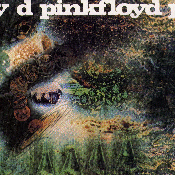 by Dave Ward
The Fathers of Space Rock The Pink Floyd, particularly in their early years, were often labeled as the 'fathers of space rock.' After all, despite Roger Waters' denials, the Floyd did tip their hats to science fiction fairly regularly during the late 1960s and early 1970s. There was "Astronomy Domine", the first song on their very first LP album, as well as the imagery suggested by "Interstellar Overdrive" on the same LP. They would go on to record "Let There Be More Light", which deals with alien contact, and although the lyrics themselves were based on verses from Chinese poetry, the title of "Set the Controls for the Heart of the Sun" inevitably added to the momentum behind the label. And of course, there was The Dark Side of the Moon to deal with. Even as recently as their latest albums, The Division Bell (1994) and p.u.l.s.e (1995) there were astronomical references in the observatories and spaceship pictures in the packaging of the albums. The band have sometimes disputed the label. "We don't deliberately try and make everything come out like that," David Gilmour once said. "It just works out that things happen that way. We all read science fiction and groove to 2001; it's all very good. But some of our things happen completely accidentally." (Disc & Music Echo, 22 November 1969) Syd Barrett himself said he hadn't really been interested in science fiction since he was about 15. Nick Mason, recognizing that the moon is a metaphor and not literally a moon, once said, "I think that Dark Side has proved that the Floyd aren't interstellar rock music and that they haven't been for years." (Ciao 2001, 25 May 1975) But it was Roger Waters who hit on the most important point about the 'space rock' label: "The space thing was a joke. None of those pieces were about outer space. They were about inner space. That's all it's ever been about-human beings and their insides, whether it was Syd's writing or mine. They were both about the same thing." (Rolling Stone, 19 November 1987) Outer versus inner
It was the end of Barrett's innocence, but also the beginning of his journey into inner space. During that journey, but before his irreversible breakdown, Barrett wrote "Astronomy Domine"—an excellent example of a lyric which mythologizes space, converting what appears superficially to be a song about outer space into a song which is, in fact, very much about the author's own mental strife and his inner frailty and confusion.
Outer space and underwater imagery mingle freely in the song. The subterranean waters are cold and green. Both underground caverns and bodies of water have been metaphorical representations of the subconscious for centuries. From the opening lines, Barrett immediately establishes that we are talking about the dark, hidden corners of the mind in this song.
In the lyrics and music, the alien planets and moons seem to fly past. The question "Where are we?" can only be answered: Lost in the depths of space. And Barrett assures us that it can be frightening. He ought to know. He had been trapped between Venus and Jupiter once himself, and the image of being trapped between planets summed up his emotional state. He was on the road to an eventual breakdown, and must have often felt lost and alone, and felt pulled in many directions at once by emotional gravities.
The randomness and noise is an intense lyrical combination, carrying a sea of possible interpretations within its vagueness: Fear. Flashing lights and loud noises—perhaps stage lights and sounds, or perhaps LSD-induced hallucinations. And then there's the almost random reference to 1960s comic book hero Dan Dare, a pilot known for his adventures in space. Roger "Syd" Barrett was on his adventure into space when he penned the lyrics—but it was not some kind of science fiction journey into outer space, nor was it strictly a drug-induced 'space-out.' Syd's journey was into himself, into his own inner space. "Astronomy Domine" stands as an impressionistic lyrical and musical portrait of the mental anguish and confusion that marked the beginnings of his self-understanding—and his eventual mental breakdown. Roger Waters was right when he asserted that "none of those pieces were about outer space. They were about inner space." Looking through the Floyd catalog, it's difficult if not impossible to find a song which is truly about outer space. To understand mythology—whether it's the literature of ancient cultures, or the music of a mythically-inclined pop band—it is absolutely critical to remember that outer space is almost without exception a metaphor for inner space and self-understanding. It might be very appropriate to amend the old label slightly, and declare Pink Floyd to be 'the Fathers of Inner Space Rock.'
Dave Ward is editor of The Steel Breeze Pink Floyd news service, and is also an avid student of mythology and rituals. He manages an intimate, low-traffic mythology discussion forum, Living Myth, which myth enthusiasts are welcome to join. |

